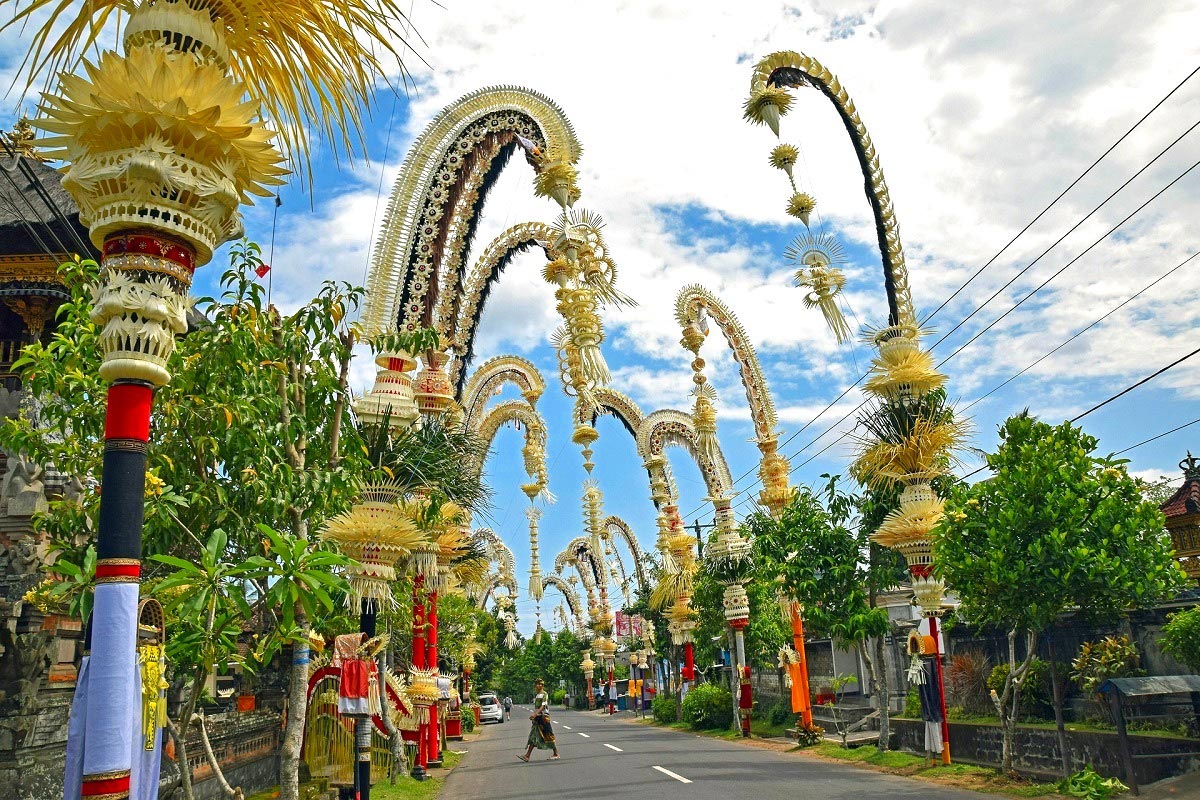
Bali Galungan and Kuningan is a big holiday for Hindus in Bali and on this day many Hindus come to the temple to pray and ask for blessings from God and its manifestations. Galungan and Kuningan Day is a holiday to celebrate the victory of celebrating the victory of Good (Dharma) against Evil (Adharma) where Balinese people will pray to big temples and family temples to celebrate this Galungan and Kuningan holiday. And it is held every six months based on the Balinese calendar, where one month has 35 days, and on the Galungan day of Hindus in Bali. A very universal celebration, where all Hindus in Bali regardless of caste, ethnicity and class will celebrate this holiday. So when you visit the island of Bali on Galungan and Kuningan holidays you will see many Hindus praying to the temple. A very spiritual sight, where to see Hindus celebrating their special day by praying in the temple
All you need to know about Galungan and Kuningan
Galungan and Kuningan Ceremony is a holiday that every six months based on the Balinese calendar is always celebrated by Hindus in Bali, as for the fall of Galungan on Wednesday, Wuku Dungulan and eleven days after Galungan will celebrate the Kuningan Day which falls on Saturday, brass wuku. A holiday that has the same meaning but a different day to celebrate it. A very holy celebration, where Hindus will pray at family temples and other large temples to ask for blessings from God and its manifestations, as for the meaning of the guling and brass holidays are as follows
Galungan and Kuningan are very important days for Hindus in Bali, because on Galungan day Hindus celebrate the victory of Dharma against Adharma by praying at family temples and large temples such as Besakih, Lempuyang, Uluwatu, Tanah Lot and others. And on Kuningan day is a very important day too because on this day it is believed that the gods come down to the world and sit in big temples and it is an opportunity for Hindus to worship and make offerings to the gods so that they are blessed and given a harmonious life. The origin of the Galungan and Kuningan holidays is not known for sure, and based on research from inscriptions and lontar as well as community stories circulating. The history that we can tell here is based on the myths circulating in the community about the Galungan holiday and also based on the lontar relics of ancient times which are still stored and preserved.
As for the origin of the Galungan holiday, it is very difficult to determine exactly when it was first held, which we can trace from ancient relics, namely from the Balinese Dwipa Purana lontar which states that Galungan Day was first celebrated on full moon kapat (Kliwon dungulan buddha) in 882 AD or sakan year 804. In the lontar it is stated that "Punang Aci Galungan Ika Ngawit, Bu, Ka, Dungulan sasih Kacatur, 15th, Isaka 804. Bangun Indria Buwana Ikang Bali Rajya" which means "Celebration of the Galungan feast First of all, it is Wednesday Kliwon, Wuku Dungulan, Sasih Kapat on the 15th in the year 804 Saka. The situation on the island of Bali is like Indra Loka. The lontar can be likened to a holy guide and library kept by Hindus as a guide from ancient knowledge. Without lontar we will not know what happened in ancient times. And now Galungan and Kuningan holidays are held twice a year in the Gregorian calendar. A celebration filled with joy by Hindus to welcome the arrival of the gods into the world by taking a palace in large temples, and the opportunity to welcome the gods by praying.
Galungan and Kuningan holidays are very important holidays for Hindus in Bali, the philosophy of Galungan Day is to celebrate the victory of Dharma (goodness) against Adharma (Evil). Galungan Day has the meaning to unite spiritual strength in order to get a calm mind and stance which is a symbol of Dharma and it is hoped that good and positive thoughts can win against lust and negative things which are symbolized as Adharma. While the Kuningan Day is to ask for safety, protection and inner and outer guidance to Gods, Bhatara and other manifestations of God who will give blessing to his people to live a life in full harmony. So it is expected for Hindus in Bali to always have positive thoughts in living life, so that everything goes in harmony and happiness will be created by itself. A holiday meaning that is very important in guiding its people to the path of truth and always remembering the power of God Almighty. For people who cannot go home to pray at the family temple or big temple, they can pray at Jagatnatha Temple.